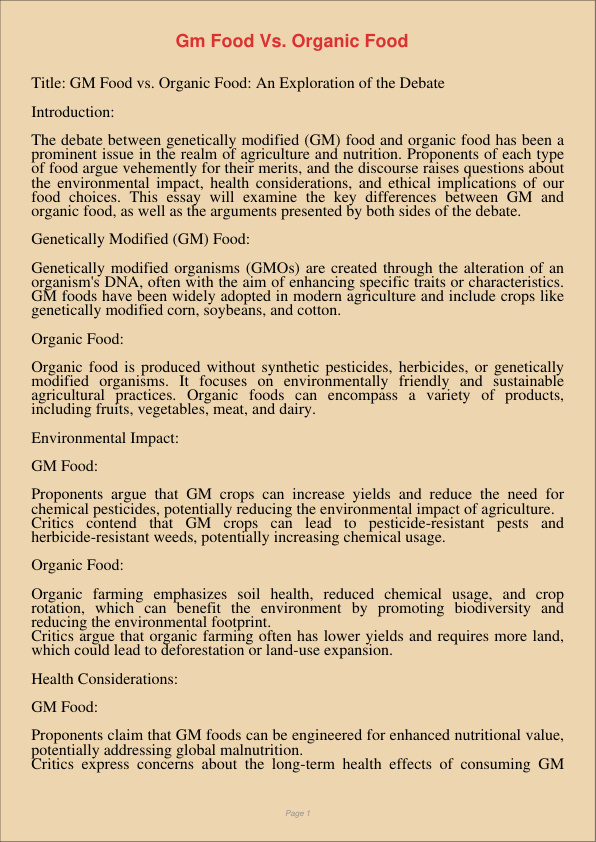
Title: GM Food vs. Organic Food: An Exploration of the Debate
Introduction:
The debate between genetically modified (GM) food and organic food has been a prominent issue in the realm of agriculture and nutrition. Proponents of each type of food argue vehemently for their merits, and the discourse raises questions about the environmental impact, health considerations, and ethical implications of our food choices. This essay will examine the key differences between GM and organic food, as well as the arguments presented by both sides of the debate.
Genetically Modified (GM) Food:
Genetically modified organisms (GMOs) are created through the alteration of an organism’s DNA, often with the aim of enhancing specific traits or characteristics. GM foods have been widely adopted in modern agriculture and include crops like genetically modified corn, soybeans, and cotton.
Organic Food:
Organic food is produced without synthetic pesticides, herbicides, or genetically modified organisms. It focuses on environmentally friendly and sustainable agricultural practices. Organic foods can encompass a variety of products, including fruits, vegetables, meat, and dairy.
Environmental Impact:
GM Food:
Proponents argue that GM crops can increase yields and reduce the need for chemical pesticides, potentially reducing the environmental impact of agriculture. Critics contend that GM crops can lead to pesticide-resistant pests and herbicide-resistant weeds, potentially increasing chemical usage.
Organic Food:
Organic farming emphasizes soil health, reduced chemical usage, and crop rotation, which can benefit the environment by promoting biodiversity and reducing the environmental footprint. Critics argue that organic farming often has lower yields and requires more land, which could lead to deforestation or land-use expansion.
Health Considerations:
GM Food:
Proponents claim that GM foods can be engineered for enhanced nutritional value, potentially addressing global malnutrition. Critics express concerns about the long-term health effects of consuming GM foods, suggesting that they may lead to unforeseen consequences.
Organic Food:
Advocates of organic food highlight the absence of synthetic chemicals, making it a healthier option for consumers. Critics argue that organic foods are not necessarily safer, and they may be more susceptible to microbial contamination due to less chemical use.
Ethical Implications:
GM Food:
Proponents argue that GM crops can help feed the world’s growing population by increasing agricultural efficiency. Critics raise ethical concerns about corporate control over GM seeds and the potential for farmers in developing countries to become dependent on multinational agribusinesses.
Organic Food:
Advocates of organic farming see it as a more ethical and sustainable approach to agriculture, respecting the environment and animal welfare. Critics suggest that organic food may not be scalable enough to feed the world’s population, raising questions about its feasibility as a global solution.
Conclusion:
The debate between GM food and organic food is complex, with valid arguments on both sides. Ultimately, the choice between the two often depends on individual preferences, values, and priorities. As consumers, we have the responsibility to be informed and make choices that align with our beliefs and considerations regarding the environment, health, and ethics. It is also essential to continue exploring agricultural practices that can balance the need for food security with environmental sustainability and human health.
「真诚赞赏,手留余香」
真诚赞赏,手留余香
使用微信扫描二维码完成支付
